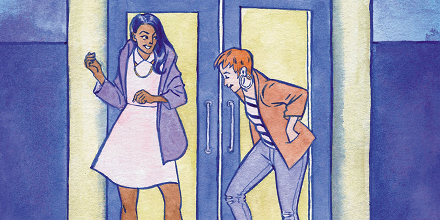Danielle Binks is a writer, reviewer, agent and book blogger who lives on the Mornington Peninsula. In 2017, she edited and contributed to Begin, End, Begin, an anthology of new Australian young adult writing inspired by the #LoveOzYA movement, which won the ABIA Book of the Year for Older Children (Ages 13+) and was shortlisted in the 2018 Gold Inky Awards. The Year the Maps Changed is Danielle’s debut middle-grade novel.
Today, she’s on the blog to tell us all about it and how it was inspired by Australia’s treatment of asylum seekers. Read on!
The old writer’s advice is to ‘write what you know’; I didn’t do that . . . exactly. I wrote instead, what I wanted to know. I wanted to remember a time from the depths of my childhood; when the rest of the world came to my back door, it seemed.
The Year the Maps Changed took five years to research and write; but in many ways, it’s been two decades in the making. It is at once the story of one year in the life of an 11-year-old girl who is feeling upheaval in her family life, and the tale of a turning-point in Australia’s treatment of refugees and asylum-seekers . . .
I grew up on the Mornington Peninsula, where my book is set. Throughout my childhood I visited the beaches of Portsea and Sorrento, Mount Martha and Mornington, attended high school in Mt Eliza and rode the old Arthurs Seat chairlift. And in 1999 I was in Year Six; the same as my protagonist Winifred ‘Fred’ is in the book.
I do have only the vaguest memories of ‘Operation Safe Haven’ – the biggest humanitarian exercise undertaken by the Australian government, when they welcomed some 4000 Kosovar refugees into “safe havens” at eight locations in five states around the country, including an abandoned Quarantine Station on Point Nepean.
I wish I could say I drew on my own memories of this time for Fred’s story, but since I’ve been digging into these historic events, I am no longer certain where my own remembering ends and researching begins.
There are still parts of myself that I gave to Winifred though – like a grandparent who lived out the back of the main house, and a father in the police force; which my own was, retiring after 17 years.
I also chose to write The Year the Maps Changed as a middle-grade book, not so much to draw directly on my own memories from that age and time in 1999, but because I wanted to write what I didn’t know. I remember that being an age of great uncertainty; when I was just starting to figure out that the world stretched beyond my own little corner of it, and I wasn’t sure where I fit in the grand scheme of anything.
What I learnt in the process of writing, was this; though it was 20-years-ago, Operation Safe Haven was perhaps the last time Australia had a semi-positive experience in its treatment of asylum seekers, and its response to a global refugee crisis. Sitting alongside the Kosovo War in 1999 is the East Timor Crisis, and then in August 2001 it’s the Tampa Affair that forever distorts and cements Australia’s treatment of refugees … and finally; the tragic events of September 11 one month later seems to have set Australia on a new course entirely, one we still haven’t managed to correct or find our way back from.
I am most drawn to the ‘coming-of-age’ theme, and thought the tale of a country beginning to lose its way, alongside an 11-year-old girl starting to understand her own beliefs and finding her place in the world, and within her community, was entirely appropriate.
Because children do – of course – have a rightful and important place in our politics, their communities, and especially as global citizens. This is a major theme of the book, represented through the motif of maps – as Fred is forced to navigate the new landscape of her home-life, and the physically changing world around her for which she is becoming increasingly conscious, and actively involved.
If I have any hope for this book; I think it’s to show children that their opinions and experiences do matter, and they should be engaged with the world around them – because they have every right to want to change it, and to navigate their own way to do just that.
—The Year the Maps Changed by Danielle Binks (Hachette Australia) is out on the 28th of April.

The Year the Maps Changed
One extraordinary year will change them all...
Sorrento, Victoria, 1999. Fred's family is a mess. Her mother died when she was six and she's been raised by her Pop and adoptive father, Luca, ever since. But now Pop's had to go away, and Luca's girlfriend Anika and her son have moved in. More and more it feels like a land-grab for family and Fred is the one being left off the map. Even as things feel like they're spinning out of control for Fred, a crisis from the other side of the world comes crashing in. When a group of Kosovar-Albanian refugees are brought to a government...









 REVIEW: The Monster of Her Age by Danielle Binks
REVIEW: The Monster of Her Age by Danielle Binks  Young adult fiction highlights for August!
Young adult fiction highlights for August!
Comments
No comments